|
|
|
Sort Order |
|
|
|
Items / Page
|
|
|
|
|
|
|
| Srl | Item |
| 1 |
ID:
178622
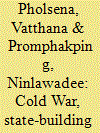

|
|
|
|
|
| Summary/Abstract |
This article analyzes two key frontlines during the Cold War, border areas in the provinces of Savannakhet (central Laos) and Nakhon Phanom (northeastern Thailand), adjacent to the Lao-Vietnamese and Thai-Lao borders, respectively. We investigate the distinct transformative experiences of war and revolution on members of the same ethnic minority – the Phutai – in both locations. The wartime trajectories of these populations diverged significantly, partly because their territories experienced very different pre-Cold War histories. As a consequence, Phutai in Thailand moved through homogeneous ethnic space between Thailand and Laos. In contrast, the Phutai in Laos, hemmed in by political, topographic, and ethnic boundaries, contributed to the building of a communist proto-state. The Phutai were confronted by different communist projects, which also shaped their distinct revolutionary experiences: the Communist Party of Thailand (CPT) boosted ethnic minorities’ resistance against the Thai state’s nationalist ideology, while the Lao revolutionary movement facilitated ethnic minorities’ social mobility within the Pathet Lao apparatus. Whether through confrontation in Thailand or accommodation in Laos, Phutai in both locations played active roles in the multi-layered history of the region.
|
|
|
|
|
|
|
|
|
|
|
|
|
|
|
|
| 2 |
ID:
178624
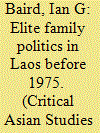

|
|
|
|
|
| Summary/Abstract |
Major General Phasouk S. Rajphakd and Brigadier General Soutchay Vongsavanh were important right-wing military officers in the Royal Lao Army in southern Laos before 1975. However, elite family relations in Laos – especially between prominent families from the north and the south – greatly affected how they acted and interacted over the years. This article considers family relations in Laos during the 1960s and early 1970s. Kinship relations are certainly not determinant of all social or political interactions, as individual agency is also important, but they are often crucial nonetheless. There has been insufficient discussion about how elite family relations played out in Laos during the 1954–1975 period. To partially fill this gap, this article explores how tensions between the House of Champassak in southern Laos and the House of Luang Prabang and the powerful Sananikone family in Vientiane led to disunity amongst non-communist factions in Laos, and eventually contributed to the Pathet Lao takeover of the country in 1975.
|
|
|
|
|
|
|
|
|
|
|
|
|
|
|
|
| 3 |
ID:
178632
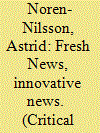

|
|
|
|
|
| Summary/Abstract |
This article seeks to advance understanding of how the new logics of an expanding digital media system can be mobilized in the service of authoritarianism, by tracing how an online news platform support the legal and discursive production of hegemonic authoritarianism in Cambodia. A state crackdown on independent media has been accompanied by the rise of private digital news outlet Fresh News, which has played a singular role in enabling, legitimizing, and seeking to craft support for Cambodia’s recent shift from competitive to hegemonic authoritarianism. Fresh News represents an authoritarian innovation which can be broken down into three main components: articulating a government-aligned definition of democracy which celebrates strongman rule and rejects liberal democracy; supporting an ongoing judicialization of Cambodian mega-politics; and disseminating a “fake news” discourse which seeks to achieve an epistemic shift. The ambiguous status of Fresh News as a private though overtly state-sanctioned enterprise is a key aspect of these authoritarian innovations, as it popularizes Cambodia’s authoritarian turn from the vantage point of an elusive distance from the state.
|
|
|
|
|
|
|
|
|
|
|
|
|
|
|
|
| 4 |
ID:
178627
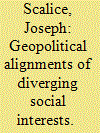

|
|
|
|
|
| Summary/Abstract |
In April 1967, the Partido Komunista ng Pilipinas (PKP) broke in two. This article examines how a contradiction at the heart of the party’s program, which sought to retain leadership over both a mass movement and an alliance with a section of the elite, fragmented the party along the lines of the Sino-Soviet dispute. The ideological expression of the rival national interests of the Soviet Union and People’s Republic of China found congruent alignment with the diverging social forces in the PKP. The Soviet bureaucracy offered attractive terms of trade to countries of belated capitalist development. Sections of Filipino capitalists saw this as a means of developing national industry, and leading layers of the PKP allied themselves with the Marcos administration in support of these ends. In contrast, a cultural revolution and a protracted people’s war expressed the geopolitically imperiled position of China. University-based youth were drawn to this perspective. Over the course of 1966, the PKP was torn apart along the fault-lines of the Sino-Soviet ideological split, as this global dispute gave political form to the diverging social interests within the party.
|
|
|
|
|
|
|
|
|
|
|
|
|
|
|
|
| 5 |
ID:
178634
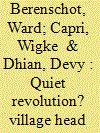

|
|
|
|
|
| Summary/Abstract |
While democratization is regularly associated with elite renewal, established elites often succeed in maintaining their dominance after the fall of the authoritarian regime that fostered them. This constitutes a relatively understudied challenge facing democratization processes: when and how do democratic reforms succeed in fostering the emergence of new elites? This paper addresses this question through a study of village head elections in three rural districts around Yogyakarta, Indonesia. Comparing older studies of village head elections with ten in-depth studies of recent village head elections as well as assessments of the backgrounds of eighty village heads (kepala desa), this paper shows that a remarkable change has taken place. Whereas up to ten years ago many villages were still ruled by leaders from established families with a quasi-hereditary grip on power, in recent years such leaders are rapidly being replaced by village heads with more modest family backgrounds and a different style of leadership. This important change has resulted from a combination of democratic reforms, the diversification of rural economies, and the particularly competitive character of village head elections. Elite renewal is possible when open and information-dense elections coincide with a process of economic diversification undercutting the economic dominance of established elites.
|
|
|
|
|
|
|
|
|
|
|
|
|
|
|
|
| 6 |
ID:
178630
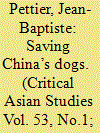

|
|
|
|
|
| Summary/Abstract |
To be considered worthy of society’s protection is not the objective consequence of an inherent quality but the result of a social process. This article examines this observation through the case of canine welfare in China. Popular defense of dogs against brutalization and consumption, as well as state regulations, have become common in China in recent years, generating conflicts over the value attributed to dogs. To understand the circumstances behind and broader implications of activists’ support for protecting dogs, this article identifies elements that are determinant: framing; prioritization; the relationship between protectors and protected; and the socio-political background of these campaigns.
|
|
|
|
|
|
|
|
|
|
|
|
|
|
|
|
| 7 |
ID:
178633
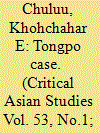

|
|
|
|
|
| Summary/Abstract |
Environmental conflict between indigenous peoples and state agencies developing natural resources has become a global phenomenon. This article presents a compelling but underreported incident of environmental conflict in China. The Tongpo case describes a struggle between a Mongol pastoral people who worship and protect their sacred mountain and a Han Chinese natural resource development company that began constructing a coking mill at the foot of this mountain in late 2005. This paper gives a detailed account of the origins, development, and impact of the Tongpo case from the perspective of indigenous environmental justice. It focuses on two related subjects: how Mongol indigenous institutions in China have protected the environment, and how environmental injustice has occurred at the local level in China. By applying an indigenous environmental justice lens to this case study, this paper exposes how environmental injustice is manifested through internal colonialism, nationalism, and racism and illuminates the ways in which indigenous groups protect their sacred lands.
|
|
|
|
|
|
|
|
|
|
|
|
|
|
|
|
| 8 |
ID:
178636


|
|
|
|
|
| Summary/Abstract |
The United States has been at war in Afghanistan for nearly twenty years, with arguably no discernible end in sight. Yet there has been no public accounting of the costs of the on-going conflict, either for Afghanistan or America. While the war’s destruction is readily visible throughout much of the Afghan countryside, it is no less profoundly damaging to the social and political fabric of the United States. As the costs for this conflict come due, the U.S. will be faced with a bill it may be ill-equipped to pay – not only financially, but socially and politically as well. Indeed, Afghanistan may be the war that ultimately destroys American democracy as we know it.
|
|
|
|
|
|
|
|
|
|
|
|
|
|
|
|
|
|
|
|
|